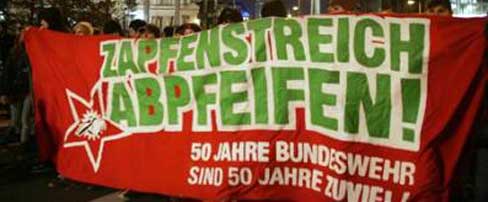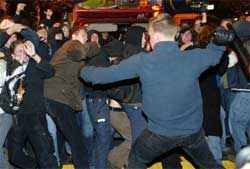Diese Seite ist ein Archiv und wird nicht mehr aktualisiert. Die neue Seite von RIO ist: www.klassegegenklasse.org

Old rituals with new uniforms:
The German army celebrates itself.
On October 26, the German army paraded in front of the Reichstag (1) with torches, drums, whistles and trumpets, with "Stand at attention!" and "Remove helmets for prayer" - that was the "Große Zapfenstreich" (2), a tradition going back to 1838.
The Motto - "50 years of the Bundeswehr (3) - 50 years of the parliamentary army" - was an insult to any democrat, as just last year the German parliament voted to make it possible to start wars without the approval of any democratically elected body.

The army's propaganda event began at 5 o'clock with a reception of prominent politicians from across Europe. At the same time around 2,000 people gathered at the Alexanderplatz in the center of East Berlin for a demonstration against German militarism. Antimilitarist and antifascist groups, socialist and communist organisations, the left parties "WASG" und "Linkspartei.PDS", as well as several trade union departments joined the protest. But the mobilization of the reformists was quite weak, considering that the Linkspartei has 11,000 members in Berlin. The Linkspartei's member of parliament Paul Schäfer went to the army's celebration, by the way.
From the Alexandplatz we moved at 6 o'clock in the direction of the Brandenburg Gate. With our banner, which we carried in front of the loudspeaker truck, we remembered the German revolutionary Karl Liebknecht and his famous slogan "The main enemy is at home!" The speeches that were held during the demonstration pointed out the relation between the restructuring of the Bundeswehr and the intensifying international competition. The speaker from REVOLUTION talked about the importance of antimilitarism for young people around the world.
At a corner a few hundred meters before the Brandenburg Gate, the demonstration was blocked by fences, three rows of police in riot gear, several police vans, water cannons and tanks.
We called on the police to let us pass, since we had a judge's order and a district attorney's assurance that we could stand in front of the Brandenburg Gate at 8 o'clock.
Only at 8:20 did the police answer: twenty green (4) thugs jumped over the fences and began beating people with batons. The attack could be resisted with the help of chains of people, and in the end we made it to the Brandenburg Gate, well after the Zapfenstreich ended.
The most famous person at the demonstration was a plain-clothes policeman who got a bit too excited about beating people: he apparently forgot that he wasn't wearing an anonymizing uniform and was surrounded by dozens of cameras. The state was forced to suspend him and open an investigation.But the incident had something good for the bourgeois press: On Wednesday there were reports about the great Zapfenstreich with a few "small brawls with the police", but on Thursday the only things they had to write about police violence was that one officer went crazy and now had to deal with the consequences.
To demonstrate the "idependence" of the bourgeois press, I would like to end with an article in the Berliner Zeitung about friendly but determined military police: "In the nearby park, the police found several depots with cobblestones and paint balloons. Obviously not all peace demonstrators had peaceful intentions."
//by Ladmie from Kreuzberg //German original in REVOLUTION #14
Speech by REVOLUTION
The "Große Zapfenstreich" is being held in front of the Reichstag, where the German state has shown off its military power for the last two hundred years. This ritual is a child of Prussian militarism.
Officially, there is no continuity between the armies of the German Empire (5), the National Socialist Wehrmacht (6) and the "democratic" Bundeswehr.
But over the last century the most important companies in Germany have changed neither their names nor their owners nor their economic interests. That is why the German army has had to intervene again and again in the same places. For example the Serbian capital Belgrade was attacked in 1915 by the Imperial Army, in 1941 by the Wehrmacht, and in 1999 by the Bundeswehr. Did the population of Belgrade realize that this time it was "democratic" bombs that the German army was dropping?
Currently the German state is attempting, as the most powerful component of the EU, to become a world power of the same class as the USA. For this it isn't enough that German companies make profits around the world: they must be able to defend their economic interests with military means. That is why the current "hoard of draftees", whose mommies would never let them be sent into the jungle, is being transformed into a professional intervention army.
At the moment around 6,000 Bundeswehr soldiers are stationed in foreign countries. In Afghanistan the Bundeswehr has the most soldiers in the occupation force ISAF. Also in Kosovo, Macedonia, Sudan and other countries, the Bundeswehr ensures a so-called "peace" in the interest of German companies.
That's why he "anti-war-rhetoric" of Schröder, Chirac and other European politicians is pure hypocrisy. It's no coincidence that the axis Paris-Berlin-Moscow, which spoke out against the Iraq War, included precisely those states which enjoyed good economic relations to Saddam's Iraq.
The Bundeswehr, like any army, has a powerful interest in youth. As soon as a young man turms 18, the first orders to report to the draft board arrive. In times of mass unemployment, lack of apprenticeships, and university fees, the Bundeswehr tries to attract potential recruits with promising offers. For example, the departing Defense Minister Struck praised the Bundeswehr's Leadership Academy in Hamburg as a good alternative for students who can't afford to pay the recently-introduced university fees.
Even recruitment at schools is no longer taboo for the German military. At countless "career weeks" the Bundeswehr presents itself as a normal business. And school the students who resist this military advertising are charged with crimes.
But across the world young people resist this growing militarism. For example in the USA "Die In's" (actions, where activists play bloody corpses) are regularly organized in front of recruitment officies. And the biggest resistance against the US army takes place in Iraq, where tens of thousands of young people fight against the occupation.
So let's bring millions of young people out onto the streets, against this ritual which reminds so much of nazi times, and against every type of militarism!
We say: Bundeswehr - out of the schools! Out of Afghanistan! Out of the world!
One solution: Revolution!
Some explanations
(1) German parlament building, constructed in Imperial times
(2) this ceremony literally means "Big Tap-Closing". It originated with a procedure where a Prussian military commander would go through the bars and close the taps so the soldiers would return to the barracks. Over the years the "Tap Closing" evolved into a nightly ritual where the soldiers would assemble with torches in front of the barracks. On May 12th 1838 the first "Big Tap-Closing" was organized in Berlin, and since then it has been the most important ceremony of the Prussian and German military.
(3) the Bundeswehr is the army of the Federal Republic of Germany, established in 1955.
(4) green is the color of most German police
(5) an imperial army was created with the unification of Germany in 1871. In 1921, after the defeat in the First World War and the abdication of the Emperor, the army was named the Reichswehr.
(6) the Wehrmacht was the name given to the German Army by the National Socialist government in 1935. It was dissolved in 1945.
Diese Seite ist ein Archiv und wird nicht mehr aktualisiert. Die neue Seite von RIO ist: www.klassegegenklasse.org

